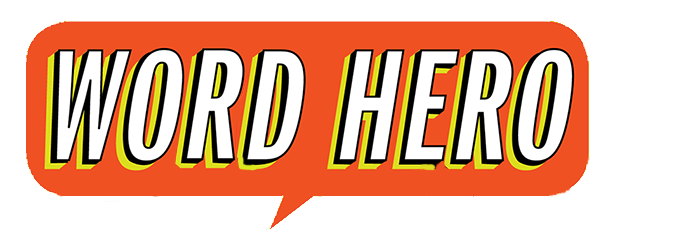Jay Heinrichs Interviews Jay Heinrichs
(a.k.a. infrequently asked questions about WORD HERO)
Grammar teaches the rules. I show you the tools, moving beyond correct words to powerful words.
Why did you write WORD HERO?
Ever since I bought my first book of quotations in high school, I’ve loved exploring the magic behind words that make people immortal—the unforgettable lines uttered by the likes of Martin Luther King, Harriet Beecher Stowe, and Jon Stewart. I’ve spent years unearthing the tools that make these quotes powerful.
Will WORD HERO make me wittier?
Sure, with practice. For instance, after learning the belonging trope, you’ll be able to make your question more interesting. “How will WORD HERO make women in bars fall all over me?” Or: “How will WORD HERO get me to make my parents laugh when they’re about to ground me?” And, after you progress from making your questions interesting to being an all-around wit, women in bars will start falling over you (possibly when they’re sober) and you will remain ungrounded for life.
Do women fall all over your witty self?
Absolutely. My wife and daughter adore me. And they only pretend to be sick of my constant wordplay.
What makes you such an expert?
While I’m not an academic, I’ve pored over the old texts that revealed the secrets of powerful language, from Aristotle to current thinkers. My blog, Figarospeech, has been one of the most popular language sites for some years now. I’ve lectured on rhetoric and given workshops across the country, from college campuses to corporate headquarters. And having spent years as a writer, editor and manager—as well as a marketing and content consultant— I’ve picked up some insights into words that work.
What kinds of tools?
Neuroscience tells us that words get imprinted on people’s memory in three ways: with sounds, with pictures, and with associations—links between ideas and things. My tools, which I adapted from the ancient art of persuasion, use choice words in striking order to tap into these “memory keepers.” I call the overall method the SPA treatment. Sounds, Pictures, Associations. Go to my WORD HERO site to find a cool quiz that tests your ability to suss out the memory keepers in famous quotes.
You mean figures of speech and tropes? Just what are those things?
A “figure” comprises a particular choice or arrangement of words. A trope is a kind of non-literal language—words that aren’t literally true but not a lie, either. A metaphor is a trope. There are others as well that politicians and advertisers use all the time. They work in part because we don’t know how to spot them. Together, figures and tropes compose a set of “tools”—ways to use language to say memorable things and get remembered yourself.
What’s the difference between grammar and your tools?
Grammar teaches you the rules—correct use of speech. I show you the tools: figures of speech and tropes that make your words memorable. You move beyond correct words to powerful words.
Isn’t it enough to speak correct grammar?
Quotes don’t get remembered for centuries because they were “correct.” Do we admire Shakespeare for his astonishing language or for his proper use of prepositions? The Bard twisted the rules into knots. He invented dozens of new words. And he used some of the very tools you’ll find in WORD HERO.
Will your tools increase civil dialogue?
What civil dialogue? My previous book, Thank You for Arguing, has helped people disagree without anger. WORD HERO will at least make the insults and accusations more entertaining. Go ahead and insult me, but at least have the good grace to do it with wit!
What are your favorite tools?
Different tools work for different people, depending on personality and style. On the WORD HERO website you’ll find a section that helps you find the tools that suit you. My own personal favorite figure is the “mirror image” (called chiasmus by rhetoricians), which plays the flip side of a phrase or clause. “Ask not what your country can do for you, ask what you can do for your country.” It’s a huge crowd pleaser, especially in front of huge crowds.
What else?
The belonging trope. You really ought to explore that one. It unlocks the secrets of our nastiest politicians and most successful corporate branding. I’m also particularly fond of what I call the “Mr. Potato Head,” which describes a person or thing as a series of analogies. Again, you’ll have to read the book to see what I mean. When you do, you won’t be able to resist serving up Potato Heads whenever the occasion arises.
Don’t some of your tricks manipulate people?
I didn’t invent the tricks. They’re out there manipulating most of us without our knowing it. By teaching you the tools, I also show you how to spot them. The news will never be the same again. And, and yes, they let you manipulate people too. I urge readers to act like word heroes.
What’s a word hero?
To quote myself (somebody’s got to do it!): “We know the world through our words. When you enrich the language, you enrich the world. That makes you more than just memorable. It makes you a hero.”
